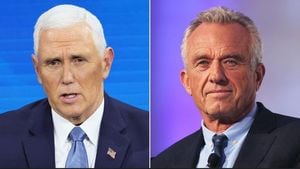The saga of Donald Trump’s presidential campaigns is nothing short of epoch-making, woven through with themes of controversy, resilience, and the shifting currents of American political sentiment. Trump's rise to the highest office was marked by unorthodox strategies and polarizing rhetoric, capturing the attention of both ardent supporters and relentless critics. His victories have sparked many discussions about his impact on American politics, transforming the GOP, and even redefining the broader political lexicon.
First, it’s imperative to understand the unique political climate leading up to Trump's initial run. Frustration with traditional political establishments, growing populist sentiments, and economic circumstance pushed many Americans to seek candidates who promised to disrupt the status quo. Trump's tagline of "Make America Great Again" reverberated with millions who felt left behind in the wake of globalization and economic restructuring.
But how did Trump turn this discontentment among voters to his advantage? No doubt, it was his knack for media manipulation. Trump's mastery of social media, particularly Twitter, allowed him to bypass conventional news outlets, directly communicating with his base. His unpredictable style, marked by spontaneous outbursts and bluntness, challenged typical political decorum and drew significant media coverage.
When Trump declared his candidacy for President on June 16, 2015, the political world was taken aback. His entrance was heralded by controversial comments, including derogatory remarks about immigrants, which alienated many yet galvanized others. This ability to polarize was pivotal; as some distanced themselves from Trump, others found their voice—often ardently supportive of his candidacy.
During the 2016 elections, the Republican primary not only saw Trump overpower seasoned political heavyweights but also showcased his appeal to fringe elements within the party. His rhetoric frequently broke from traditional conservatism, embracing nationalism and anti-establishment themes. Many voters, tired of political insiders, found Trump’s unrefined approach refreshing.
The fallout from his 2016 victory was immediate and drastic. Trump captured the presidency through the Electoral College, though he lost the popular vote to Hillary Clinton. This election underscored the stark division within the electorate and set the stage for the tumultuous Trump presidency. His time in office sparked discussions around populism, nationalism, and the future of the Republican Party.
Trump's initial presidential term was characterized by significant policy shifts, including attempts to repeal the Affordable Care Act, tax cuts for corporations, and strict immigration policies. His administration embodied the “America First” ethos, creating ripples across international alliances. The shifting of established foreign policies was met with both approval and fierce backlash, emphasizing the contentious nature of his governance.
Critics have often pointed out Trump's disregard for traditional diplomatic norms, raising eyebrows with approaches like open discussions with North Korean leader Kim Jong-un, and the withdrawal from key international accords like the Paris Agreement. While these actions reinforced his base, they simultaneously alienated traditional conservatives and moderate voters.
Beyond policies, the social ramifications of Trump’s presidency also demand attention. His tenure saw the emergence of social movements like Black Lives Matter gaining momentum (again) amid rising concerns over systemic racism. Trump’s responses to these movements often polarized the nation, igniting fierce debates about race, justice, and equity.
By the time 2020 rolled around, Trump’s presidency faced significant challenges, particularly as the COVID-19 pandemic reshaped American life. Mixed messages about handling the virus, mask mandates, and economic relief drew intense scrutiny. The failure to effectively address the mounting health crisis coincided with nationwide protests and unrest, leading some to speculate how this would impact his chances at reelection.
Despite deep-seated criticism, Trump launched his reelection bid showcasing claims of economic revival before the pandemic. The election was one of the most contentious. Voter turnout reached historic levels, and many turned out not just to reelect the president, but also to voice opposition against him. Joe Biden emerged victorious as America’s next president, with Trump again losing the popular vote, albeit with increased support from various demographic groups compared to 2016.
Trump’s post-presidency phase has been equally remarkable. The former president remains influential within the Republican Party, continuing to shape its narrative and strategy. His endorsement carries significant weight, and many GOP candidates still align with his vision of nationalism and populism. His appeal transcends traditional political boundaries, hinting at his potential to remain a pivotal figure as the country approaches the 2024 elections.
Now, as the new presidential campaign season kicks off, Trump’s candidates and policies continue to frame discussions about the future of the GOP. His followers persistently decry perceived election injustices and push narratives of alternative realities surrounding the 2020 elections. Such sentiments fuel the fire of division but also motivate organized rallies and demonstrations, displaying unwavering loyalty to their leader.
Critically, Trump’s legacy warrants unflinching analysis—how his narrative reshaped perceived norms, attitudes, and policy priorities within American politics continuing to echo through the very fabric of political discourse. It raises questions about the efficacy of mainstream media, political allegiance, and representative democracy itself.
Trump’s presidency and subsequent influence present both challenges and opportunities as the American political scene grapples with its changing identity. His undeniable impact raises eyebrows and incites debates, leading many to contemplate what the future holds not just for his political maneuvers but for the country’s political health at large.
Going forward, one can only ponder whether the GOP will fully embrace Trump’s vision or try to pivot to regain lost moderates. The question remains: can the party reconcile Trump’s unique brand with the establishment figures they traditionally rely upon? Perhaps the next election season will shed light on these dilemmas, delving even more deeply not only about Trump the politician but also the American psyche he reflects.



